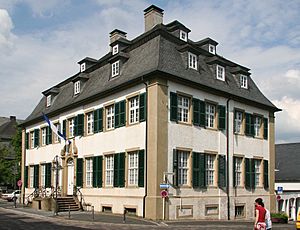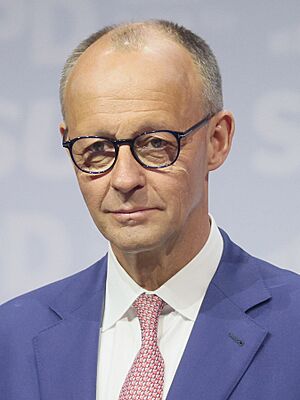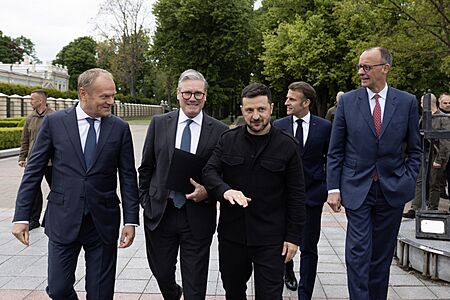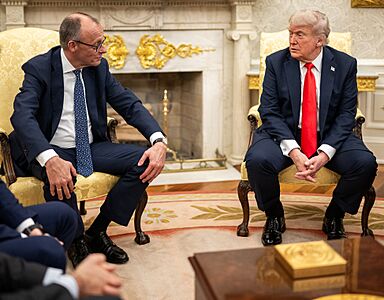Friedrich Merz facts for kids
Quick facts for kids
Friedrich Merz
|
|
|---|---|

Merz in 2024
|
|
| Chancellor of Germany | |
| Assumed office 6 May 2025 |
|
| President | Frank-Walter Steinmeier |
| Vice Chancellor | Lars Klingbeil |
| Preceded by | Olaf Scholz |
| Leader of the Christian Democratic Union | |
| Assumed office 31 January 2022 |
|
| Deputy | Andreas Jung Karin Prien Silvia Breher Michael Kretschmer Karl-Josef Laumann |
| Preceded by | Armin Laschet |
| Leader of the Opposition | |
| In office 15 February 2022 – 6 May 2025 |
|
| Chancellor | Olaf Scholz |
| Preceded by | Ralph Brinkhaus |
| Succeeded by | Tino Chrupalla Alice Weidel |
| In office 29 February 2000 – 22 September 2002 |
|
| Chancellor | Gerhard Schröder |
| Preceded by | Wolfgang Schäuble |
| Succeeded by | Angela Merkel |
| Leader of the CDU/CSU in the Bundestag | |
| In office 15 February 2022 – 5 May 2025 |
|
| First Deputy | Alexander Dobrindt |
| Chief Whip | Thorsten Frei |
| Preceded by | Ralph Brinkhaus |
| Succeeded by | Jens Spahn |
| In office 29 February 2000 – 22 September 2002 |
|
| First Deputy | Michael Glos |
| Chief Whip | Hans-Peter Repnik |
| Preceded by | Wolfgang Schäuble |
| Succeeded by | Angela Merkel |
| Member of the Bundestag for Hochsauerlandkreis |
|
| Assumed office 26 October 2021 |
|
| Preceded by | Patrick Sensburg |
| In office 10 November 1994 – 27 October 2009 |
|
| Preceded by | Ferdinand Tillmann |
| Succeeded by | Patrick Sensburg |
| Member of the European Parliament for North Rhine-Westphalia |
|
| In office 22 July 1989 – 19 July 1994 |
|
| Personal details | |
| Born |
Joachim-Friedrich Martin Josef Merz
11 November 1955 Brilon, West Germany |
| Political party | Christian Democratic Union (since 1972) |
| Spouse |
Charlotte Gass
(m. 1981) |
| Children | 3 |
| Residence | Arnsberg |
| Education | |
| Signature | |
| Military service | |
| Allegiance | West Germany |
| Branch/service | Bundeswehr |
| Years of service | 1975–1976 |
| Unit | Panzer Artillery Training Battalion 310 |
Friedrich Merz (born 11 November 1955) is a German politician. He became the Chancellor of Germany on 6 May 2025. Before that, he was the leader of the Christian Democratic Union (CDU) party starting in January 2022. He also led the CDU/CSU group in the German parliament, called the Bundestag, as the Leader of the Opposition from February 2022 to May 2025.
Merz was born in Brilon, a town in West Germany. He joined the youth wing of the CDU party in 1972. After studying law, he worked as a judge and a lawyer. In 1989, he started his full-time political career when he was elected to the European Parliament. He is known for his conservative and pro-business views. He wrote a book called Mehr Kapitalismus wagen, which means Venturing More Capitalism. This book supports ideas about economic freedom.
After serving in the European Parliament, Merz was elected to the Bundestag in 1994. He became a key expert on financial policy for the CDU. He led the CDU/CSU group in the Bundestag from 2000 to 2002. After 2002, he stepped back from politics and focused on his legal career. He worked for big companies like BlackRock Germany. He is also a licensed private pilot and owns two airplanes.
In 2018, Merz announced he would return to politics. He ran for CDU leader twice before finally winning the position in December 2021. In September 2024, he became the CDU/CSU candidate for Chancellor. After the 2025 election, the CDU/CSU formed a government with the SPD. Merz was elected Chancellor on 6 May 2025. As Chancellor, he has focused on managing Germany's finances and securing its borders. He also strongly supports the European Union and NATO.
Contents
Early Life and Education
Friedrich Merz was born on 11 November 1955 in Brilon, West Germany. His father was a judge and a member of the CDU party. His mother's family, the Sauvignys, was well-known in Brilon. Merz was raised in his mother's family home. He is Catholic.
He went to high school at Gymnasium Petrinum Brilon and later at Friedrich-Spee Gymnasium, where he finished in 1975. From 1975 to 1976, Merz served in the German Army. After his military service, he studied law at the University of Bonn and the University of Marburg. He received a scholarship for his studies. In 1985, he became a judge in Saarbrücken. From 1986 to 1989, he worked as a lawyer for the German Chemical Industry Association.
Early Political Career
In 1972, when he was 17, Merz joined the Young Union, which is the youth group of the CDU party. He became the head of the Young Union in Brilon in 1980.
Member of the European Parliament (1989–1994)
Merz was elected to the European Parliament in 1989. He served one term until 1994. In the European Parliament, he worked on economic and money matters. He also helped with relations between the parliament and Malta.
Member of the Bundestag (1994–2009)
In 1994, Merz was elected to the Bundestag, the German parliament. He represented his home area, Hochsauerland. In his first term, he was part of the Finance Committee.
In 2000, Merz became the leader of the CDU/CSU group in the Bundestag. This meant he was the main opposition leader against Chancellor Gerhard Schröder. Before the 2002 election, Merz was a key part of the CDU's campaign team. After the election, Angela Merkel took over as leader of the parliamentary group. Merz then served as her deputy until 2004.
In 2004, Merz criticized the mayor of his hometown, Brilon. He mentioned that his grandfather had been mayor during the Nazi rule. This comment caused some discussion because his grandfather had stayed in office after the Nazis took power.
Merz was a member of the Committee on Legal Affairs from 2005 to 2009. In 2007, he announced that he would not run for re-election in 2009.
Private Sector Career (2009–2018)
After leaving politics in 2009, Merz worked as a corporate lawyer. He became a senior lawyer at Mayer Brown in Düsseldorf. He focused on business deals, banking, and following rules.
He also served on the boards of many companies. These included:
- Robert Bosch GmbH (an international engineering and technology company)
- WEPA Hygieneprodukte GmbH (a hygiene products company)
- BlackRock Germany (a large investment company)
- Cologne Bonn Airport (an airport)
- HSBC Trinkaus (a bank)
- Borussia Dortmund (a football club)
In 2017, he was asked by the state of North Rhine-Westphalia to advise on Brexit and relations with the United States.
Return to Politics
When Angela Merkel announced she would step down as CDU leader, Merz decided to run for the position. He ran in the 2018 and January 2021 leadership elections but did not win. In 2021, he returned to the Bundestag after 12 years away.
Chairman of the CDU (2022–present)
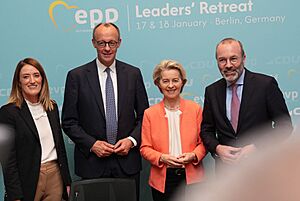
In November 2021, Merz announced he would run for CDU leader again. This time, he promised a clear change from Angela Merkel's policies. In December 2021, he won the election with a majority of the votes from party members. This was his third attempt to become party leader.
Merz was officially elected Chairman of the CDU on 22 January 2022. He received 94.6% of the votes from the party's delegates. He officially took office as party leader on 31 January 2022.
CDU Chancellor Candidate (2025)
In September 2024, Merz became the CDU/CSU's chosen candidate for Chancellor of Germany for the 2025 German federal election. The election happened earlier than planned because the previous government coalition ended.
After the 2025 election, exit polls showed that the CDU would win the most seats in the German parliament. This meant Merz would likely become Chancellor. The CDU and the Social Democratic Party (SPD) began talks to form a new government. This type of government, involving the two largest parties, is sometimes called a Grand Coalition.
On 5 March 2025, Merz suggested a big increase in spending for Germany's defense. He said Germany and Europe need to strengthen their defense quickly. He proposed changing Germany's basic law to allow more spending on defense without limits. This would help Germany finance its military and support Ukraine. Economists warned this could cause inflation and increase Germany's debt.
Merz and outgoing Chancellor Olaf Scholz agreed to change the law to allow more defense spending. They also agreed to create a special fund of €500 billion for investments in infrastructure and to help Germany become climate neutral by 2045. German lawmakers approved these changes on 18 March 2025. Merz said this decision was a big step towards a new European defense community. He also planned to increase military aid to Ukraine.
On 9 April 2025, Merz, along with other party leaders, presented the agreement for the new government. This agreement was signed on 5 May 2025.
Chancellor (2025–present)
On 6 May 2025, Merz was elected Chancellor. He needed two rounds of voting in parliament to get enough support. He and his cabinet (the group of ministers who help him govern) were sworn in on the same day.
-
Merz's May 2025 visit to Ukraine. From left: French President Emmanuel Macron, Ukrainian President Volodymyr Zelenskyy, British Prime Minister Sir Keir Starmer, and Polish Prime Minister Donald Tusk
-
Merz in the White House with US president Donald Trump on 5 June 2025
One of his first actions as Chancellor was to change how some government ministries are organized. He created a new Ministry for Digital and State Modernization. On 7 May, he made his first foreign visits as Chancellor. He met with President Emmanuel Macron in France and Prime Minister Donald Tusk in Poland.
Foreign Policy
Merz is a strong supporter of the European Union and NATO. He has described himself as "truly European, a convinced Transatlanticist, and a German open to the world". He believes in closer ties within Europe and even supports the idea of "an army for Europe".
He is known for having strong views on countries like Russia and China. In 2023, he said China was an increasing threat to Germany's security. In February 2025, Merz said Germany would talk with France and the United Kingdom about extending their nuclear protection to Germany.
United States
Merz is seen as very pro-American. He used to lead the Atlantik-Brücke association, which works to improve friendship between Germany and the United States. He has visited the US many times.
He has criticized former US President Donald Trump's trade policies. However, he also said that Germany needs to be more independent from the US. He believes Germany should become a "leading middle power" and better represent its own interests.
Russia and Ukraine

After Russia invaded Ukraine in 2022, Merz strongly supported Ukraine. He urged the German government to send weapons to Ukraine. He also visited Ukrainian President Volodymyr Zelenskyy in Kyiv.
As Chancellor, Merz has continued to support Ukraine. He has said that Ukraine has the right to use the weapons it receives, even against military targets in Russia.
Middle East Conflicts
Merz is a strong supporter of Israel. However, after becoming Chancellor, he has also expressed concern about Israel's actions in the Gaza Strip. He believes a "two-state solution" is the right long-term goal for peace between Israelis and Palestinians.
He criticized the International Criminal Court's decision to issue an arrest warrant for Israeli Prime Minister Benjamin Netanyahu. In February 2025, he said he would invite Netanyahu to Germany. In May 2025, Merz said he no longer understood Israel's policy in Gaza. After Israeli strikes on Iran in June 2025, Merz stressed that Iran should not develop nuclear weapons. He also supported US strikes on Iranian nuclear sites.
Energy and Environment

Merz believes that stopping the use of nuclear power in Germany was a big mistake.
He has said that the CDU takes climate change seriously. However, he also believes that the issue is sometimes given too much importance in political discussions. He thinks Germany can reach its climate goals with new technologies, not just by banning things. He supports a business-friendly approach to the European Green Deal.
Approach Towards the AfD
Merz has said that the CDU must keep its distance from the Alternative for Germany (AfD) party. He has stated that the CDU will not work with the AfD in legislative bodies like the EU, federal, or state parliaments. He said that if anyone in the CDU tried to work with the AfD, they would face party exclusion.
However, he has also said that at the local level, it might be necessary to find ways to work together on city or district issues. He has been criticized for these changing statements.
Personal Life
Merz is married to Charlotte Merz, who is a judge. They have three children and live in Arnsberg. Their children are a philosopher, a doctor, and a lawyer. Merz has seven grandchildren. In 2005, he and his wife started a foundation to support education projects. Besides German, Merz also speaks English and French.
See also
 In Spanish: Friedrich Merz para niños
In Spanish: Friedrich Merz para niños
 | Lonnie Johnson |
 | Granville Woods |
 | Lewis Howard Latimer |
 | James West |


